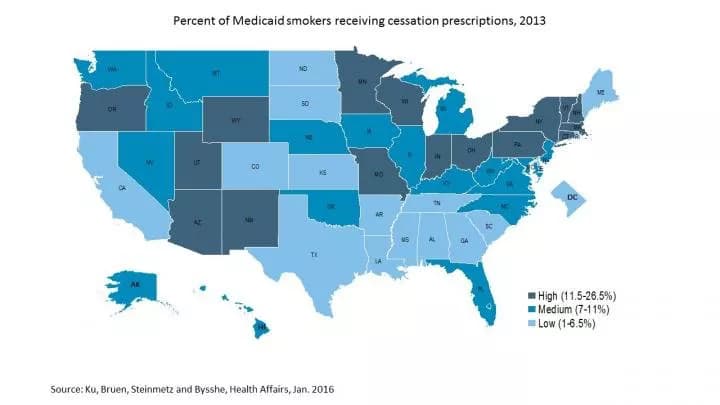
Medicaid Tobacco Cessation: Big Gaps Remain In Efforts To Get Smokers To Quit
A new study, published in the January 2016 issue of Health Affairs, by researchers at Milken Institute School of Public Health (Milken Institute SPH) at the George Washington University, provides new data on how often state Medicaid programs provide help with smoking cessation. Based on data about the level of medications purchased by Medicaid, the researchers estimate that only 10 percent of smokers on Medicaid received medication to help them stop smoking every year.
"These data show that most Medicaid programs could do much more to help smokers quit," said Leighton Ku, PhD, MPH, professor and interim chair of the department of health policy and management at Milken Institute SPH and the lead author of the study. "Data from the Centers for Disease Control and Prevention suggests that medical treatments for smoking-related diseases will cost the Medicaid program about $75 billion in 2016 but we spend less than one-quarter of one percent of that amount to help smokers quit."
Smoking, the leading cause of preventable disease in the United States, puts a particularly heavy burden on Medicaid, the nation's largest health insurance program. In fact, about one-third of US adults with Medicaid coverage currently smoke, a rate that is roughly twice as high as that for the general public, Ku says. Smokers covered by Medicaid who don't get the help they need to quit are at high risk of lung cancer, heart disease and other serious health problems, he says.
The Affordable Care Act required that all state Medicaid programs cover at least some counseling and FDA-approved therapies like nicotine gum and drugs like bupropion and varenicline. Yet this study found that some states were doing a better job than others at getting Medicaid smokers the help they need.
This study found that the utilization of anti-smoking drugs varied widely from a high of about 30 percent of Medicaid smokers in Minnesota to less than 1 percent in Texas. Even if smokers want to quit, states can erect barriers such as prohibitive cost-sharing or prior authorization requirements that can stand in the way of smokers getting this medication, Ku says.
This study found that the top five states providing Medicaid smokers with anti-smoking medication in 2013 were: Minnesota, New Hampshire, Utah, Oregon and Arizona. The bottom five states that made it hard for smokers to get this therapy in 2013were: Texas, Rhode Island, Kansas, Mississippi and Arkansas.
"Every state Medicaid program, working with public health departments and others, could make smoking cessation a higher priority to improve health and to lower health care costs," Ku said, adding that such medications work by curbing withdrawal symptoms and craving for the next smoke.
Strengthening Medicaid's commitment to anti-smoking measures could save the program money in the long run, he adds. One study estimated that $1 invested in tobacco cessation lowered Medicaid expenditures by about $3 because of a rapid reduction in hospital visits for cardiovascular disease, the report points out.
"Smoking is the number one cause of preventable illness and death in the United States," adds Kimberly Horn, EdD, MSW, associate dean for research at Milken Institute SPH and director of the DC Metro Tobacco Research and Instruction Consortium (MeTRIC). "We need to provide smokers, including those covered by Medicaid, with the help they need to quit. In addition, we need to keep working to find smarter approaches to prevent tobacco use in the first place."
The above post is reprinted from materials provided by George Washington University Milken Institute School of Public Health. Note: Materials may be edited for content and length.
Disclaimer: DoveMed is not responsible for the adapted accuracy of news releases posted to DoveMed by contributing universities and institutions.
Primary Resource:
Ku, L., Bruen, B. K., Steinmetz, E., & Bysshe, T. (2016). Medicaid Tobacco Cessation: Big Gaps Remain In Efforts To Get Smokers To Quit. Health Affairs, 35(1), 62-70.
Related Articles
Test Your Knowledge
Asked by users
Related Centers
Related Specialties
Related Physicians
Related Procedures
Related Resources
Join DoveHubs
and connect with fellow professionals

0 Comments
Please log in to post a comment.